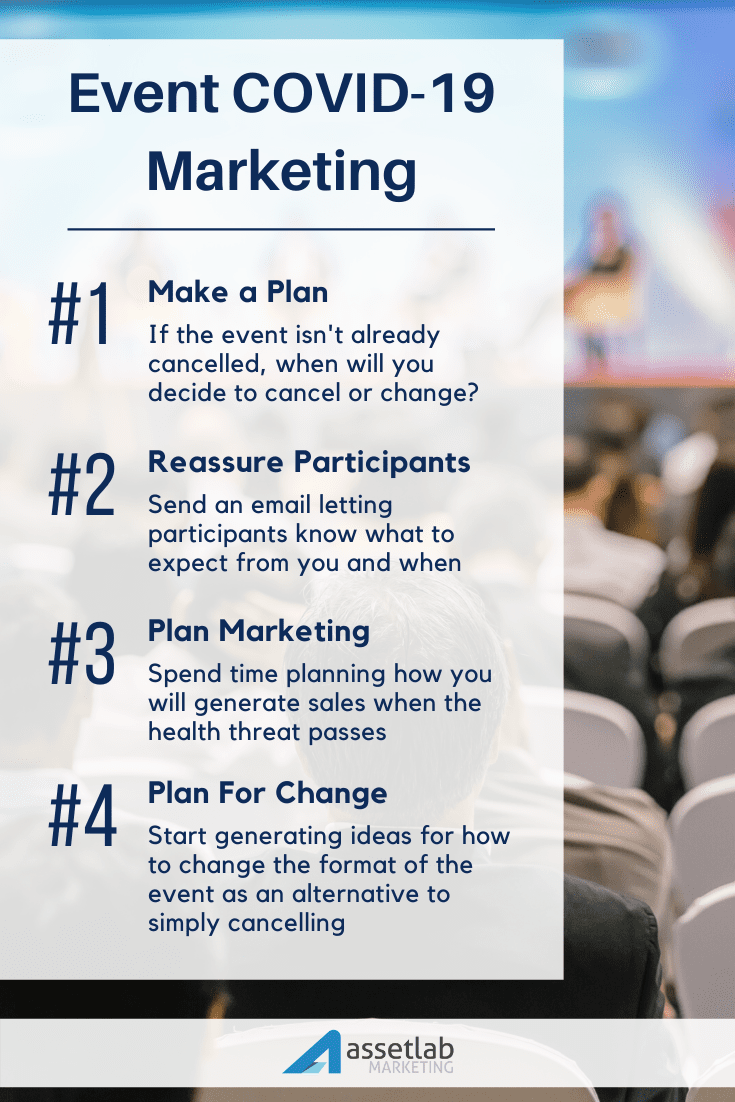The spread of the coronavirus is resulting in governments preventing gatherings. In the Seattle, WA area it started with a restriction of events over 250 people and then, within a week, moved to 50 people, quickly followed by discouraging all gatherings. If you are managing an event and these sorts of restrictions come to your area there are very specific steps you can take to message and market to help your participants.
This article assumes that your area has this sort of gathering restriction currently in place (or will soon) and that the event is outside of the timeframe when events are prohibited. If the event is in the cancellation window, it’s time to cancel. If the event is scheduled after the window, read on.
#1: What To Expect From New Sales Numbers
Clearly the registration numbers are going to be significantly impacted. The farther out the event date the less of a long term impact you can expect. I’m assuming most of you have an event scheduled within the next 6 months. Events farther out can expect a better recovery in sales than those coming sooner.
There are three phases coming at you and you’re probably already experiencing the first one:
- A complete drop off of new registrations until event restrictions have passed
- A trickle of registrations, assuming the health threat passes and people feel comfortable coming to the event
- A jump of registrations right before the event
#2: Make A Plan For When To Consider Cancellation
The first thing to do is decide when you will decide whether to hold the event or cancel it. I recommend this be at least 4 weeks before the event. From a marketing standpoint we do not want to string anyone along until the last minute with a cancellation decision.
Choosing this date gives you something to communicate to the registered participants so that they know what to expect. Now lets move on to what to communicate.
#3: Let Registered Participants Know You Care
The messaging will differ based on how soon the event is coming up:
- Example #1: Let’s say that events are restricted for the next two months, your event is 3 months away: I recommend your cancellation decision be two months from today or 4 weeks before the event. The cancellation decision date should be communicated now.
- Example #2: The event is 6 months away and events are restricted for the next two months. I recommend your cancellation decision be around 8 weeks ahead of the event (4 months from now). Participants don’t really need to know about this magic date, just that you are monitoring the situation.
Now, open your favorite email marketing tool (we typically recommend MailChimp or ConvertKit) and start building the email:
- Acknowledge the uncertainty about events given present circumstances.
- If the event is 3-4 months away, let them know when a decision will be made and communicated.
- If the event is more than 4 months away, let them know you will monitor the health situation and provide more information as the event date approaches.
- Provide some online resources people can refer to associated with the event (online fitness training for a marathon, sales resources for a sales conference, classic car Instagram account for classic car shows, etc)
- Sign off with wishes that everyone stay healthy.
#4: Plan A Marketing Push
Now that current participants are taken care of, start thinking about how to generate sales once people start buying registrations again. You will not use these plans for at least a couple months.
Here are some ideas:
- Are there ways you can adjust the event to make people more comfortable with coming that you can communicate
- Coupons or specials for friends and family of those already registered
- Combining your event with another compatible event to leverage fixed costs and increase the interested audience
- Hosting a virutal event, web conference, or other highly relevant online only event in between now and the event date while everyone is at home and on the Internet
- Contact partners, suppliers, and super-fans of the event to talk about ideas for how to promote and sell registrations after the health threat passes
Be creative and understand that today there isn’t very much that can be done, and so it is a perfect time to plan and work to engage your audience.
#5: Consider Altering The Event
Along with planning for marketing, this is the perfect time to consider changing the format of the event to that it can be delivered online or virtually. Every event is different in this regard and will experience different levels of success. Here are some ideas to consider:
- 5K Runs: Consider hosting a virtual race, use a live stream to announce results, and bring winners on to a video conference for a virtual trophy ceremony.
- Conferences: Consider moving the conference to online only. Schedule presenters, collect video conference licenses, communicate logistics, mail out snack packs and conference guides and deliver the content.
- Classes: Change delivery to video conference or webinar to provide your instruction. Think ahead. What do participants need if they aren’t present? Can you send it to them? How can you give an online experience that is also in hand?
- Concerts: This is a perfect opportunity to try moving the concert participation experience online. This will have significant impacts on attendance and so the event probably needs to be downsized if you go this direction.
The event industry, and everyone in it is feeling the pressure of restrictions on gatherings and a real concern for people being around people. Get ahead of communicating to people who are already registered, understand that the sooner the event is scheduled the harder it is going to be to generate sales, and make a plan for marketing and promotion as we get through this health emergency.



